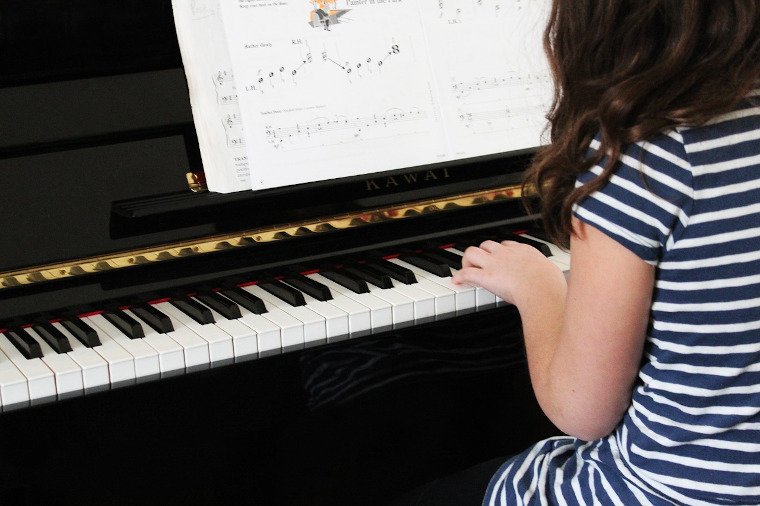
This post may contain affiliate links. See my full disclosure. As an Amazon Associate, I earn from qualifying purchases.
Does your child take private piano lessons or are you planning to start in the future? I’ve been teaching piano lessons for over thirteen years now. As I’ve worked with many students along the way, I’ve come to realize some key things that parents can do to help their child find success.

I have wanted to write on this topic for a while now. As a fellow parent, I understand that you want piano lessons to be worth your time and money.
You want your child to advance and to develop a lasting love for music—hopefully to enjoy playing long term!
So what can we as parents do to help?
How to Help Your Child Find Success with Piano Lessons
1. Make the Enjoyment of Quality Music Part of the Culture of Your Home
The goal here is to cultivate in your child a love and appreciation for music early on. This love for music will (hopefully) breed in him a desire to play music himself.
Regularly enjoy listening to all different kinds of music as a family—not just modern music with simple chord progressions, but music that is melodically and harmonically rich. Listen for fun while you play, dance, cook, and do chores!
Show your child videos of musical performances on YouTube or take them to the symphony. Check the online events page of a local college (in their music department section) to see which student recitals or concerts are open to the public.
If you play an instrument, play for your child and around your child. Let him be inspired by your own enjoyment of music.
Consider adding music appreciation studies to your homeschool to make music come alive to your child even more!
2. Don’t Rush Starting Piano Lessons
Your music teacher will have his own policies about the age to start lessons, but know that age alone is not always the best indicator of readiness.
Very few children may be ready by age 4 or 5, others do much better starting at age 6 or 7.
Generally, it is preferable that a child has started to read before beginning lessons.
The ability to read not only indicates that your child has the needed mental maturity, but that she also has the ability to learn the music alphabet and follow along with the directions in her music books.
Your child should also display physical readiness in terms of finger strength and finger independence.
Do your daughter’s fingers bend like spaghetti when she tries to press a key?
Can your son only play by poking at the notes one finger at a time? Or does he have the fine motor skills to rest at least three fingers on the keys and play one finger after the other?
Another consideration, your child should have the attention span to sit still and learn for the duration of the lesson and practice times.
I’ve found it is far better to start on the latter end of the spectrum than too early. If lessons feel “too hard” for as child because of physical or mental unreadiness, he will lose motivation and delight very quickly, oftentimes never to rebound.
3. Know Your Goals with Music and Communicate with Your Teacher
Success in piano lessons could be defined differently by different families. You’ll have to determine what your child’s goals are (and your goals for your child).
Are piano lessons just for fun, for academic enhancement, or a jumping board to study another instrument or extracurricular pursuit in a year or two?
Or does your child have the desire to go far or even pursue a music degree in college later?
Communicate your expectations with your teacher so he/she can best tailor lessons to meet your child’s needs and goals in a motivating way.
On the flip side, also be willing to understand and meet your teacher’s expectations in terms of effort and practicing even if lessons are more for fun.
Communicate regularly with your teacher and stay on the same page.
4. Provide a Quality Instrument for Your Child to Practice With
You don’t need a Steinway grand piano, but you also don’t want a poor instrument that will hinder your child’s progress.
Make sure you have a piano that is in tune with all keys working. Did you know that a piano really needs to be tuned at least once a year?
If you go the route of a digital piano or keyboard, make sure the keyboard is full length (88 keys) with weighted keys, a sustain pedal, and a stand for music books.
Make sure you have a suitable piano bench (preferably adjustable) so your child can sit at the height your teacher recommends (or have a cushion handy for your child to sit on if they need the extra height.)
5. Help Your Child Practice without Excuses
Consistent, efficient practice is the number one key to advancement. That may sound like a basic concept, but as life gets busy with school, sports, and other activities, practicing can easily be put on the back burner.
But let’s face it, no child ever became advanced in an instrument from playing only once a week on lesson day.
Work out your child’s routine to make practicing a priority in their day–and if piano is a priority, don’t overload your child with too many other activities.
Be careful to continue practicing during a break from lessons (like if you take the summer off). This is especially important if your child has recently started lessons.
Their muscle memory and ability to sight read music is so fresh that they can regress quickly.
6. Be Involved But Trust the Process
Parents who are involved enough to help their child practice consistently, recognize and encourage their effort and progress, and offer support are invaluable.
At the same time, try to trust your music teacher and the process she is taking your child through. Don’t put extra pressure on your child to meet unfounded expectations that you hold.
In other words, help your child do his best, but allow him to enjoy the process so he will want to keep at it.
7. Stick with Lessons As Time Passes
Maybe you’ll realize somewhere along the way that your child really has no bent to pursue piano and should move on to something else.
I get that. Every child is gifted in different areas, and few will become piano teachers or professional musicians.
But before you come to the decision to throw in the towel too soon, know that it can take a few years of lessons before your child has learned the fundamentals and become fluent at sight reading music.
If she is going to continue to enjoy playing leisurely throughout her life, she will need enough time to build those foundational skills.
Help her to stick with lessons long enough to see the fruit of her hard work.
Perhaps piano might also be the perfect opportunity for her to grow in character as she works steadily toward a long-term goal.
Conclusion
I hope these tips help you as your child studies piano or in preparation for future lessons!
Feel free to leave any thoughts or questions in the comments below. I would love to hear from you!
